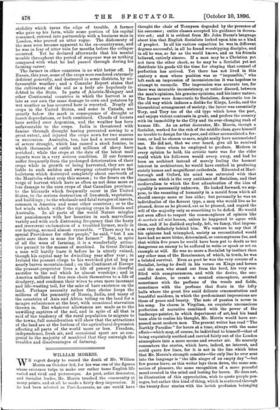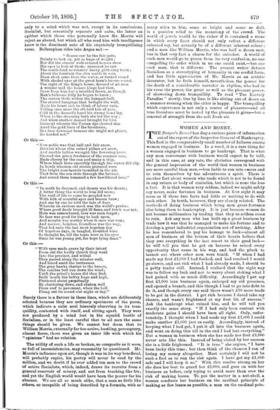WILLIAM MORRIS.
WE regret deeply to record the death of Mr. William Morris on October 3rd, for his was one of the figures whose existence helps to make our rather tame English life varied and vivid and picturesque. As poet, artist decorator, and Socialist leader, Mr. Morris touched the community at many points, and at all he made a fairly deep impression. If he had been selected as Poet-Laureate, no one would have thought the chair of Tennyson degraded by the presence of his successor; entire classes accepted his guidance in decora- tive art; and it is evident from Mr. John Burns's language about him that English Socialists looked upon him as a kind of prophet. In all his various capacities he was in different degrees successful, in all he found worshipping disciples, and in all he was, so far as the world knows, and as his friends believed, entirely sincere. If a man may be a Christian yet not turn the other cheek, so he may be a Socialist yet not distribute his goods till the time for obeying that counsel of perfection has arrived. Yet there has not lived in this century a man whose position was so "impossible," who left such an impression of inconsistencies it was hopeless to attempt to reconcile. The impression was accurate too, for there was incurable inconsistency, or rather discord, between the man's opinions, his genuine opinions, and his inner nature. The former were democratic to Socialism, democratic too in the old way which induces a dislike for Kings, Lords, and the hierarchical arrangement of society; the latter was essentially Tory, and Tory too of the old type which loves the past, and enjoys violent contrasts in grade, and prefers the country with its immobility to the City and its ever-changing rush of human life. As an artist decorator, Mr. Morris, though a Socialist, worked for the rich of the middle-class, gave himself no trouble to design for the poor, and either accumulated a for- tune, or had he chosen to save, might easily have accumulated one. He did not, that we ever heard, give all he received back to those whom be employed to produce. Modern in every opinion he held, his artistic taste was for the elder world which his followers would sweep away, and had he been an architect instead of merely feeling the keenest interest in architecture, he would have exulted in producing stately homes and magnificent cathedrals. Educated at Marl- borough and Oxford, his mind was saturated with that classicism which is the very antithesis of Socialism, and that medimvalism to which the first adumbration of the idea of equality is necessarily unknown. He looked forward, we sup- pose, to the recasting of humanity in a mould from which all should emerge more or less alike; but personally he was an individualist of the fiercest type, a man who would live as he pleased, dress as he pleased, eat as he pleased, and regard the will of the majority only as something to be defied. He would not even affect to respect the commonplaces of opinion like de mortuis nil nisi bonum, unless he happened to agree with them, and if he disliked anybody, left, we fancy, that impres- sion very definitely behind him. We venture to say that if his opinions had triumphed, society as reconstituted would have had no more bitter, determined, or contemptuous foe, and that within five years he would have been put to death as too dangerous an enemy to be suffered to write or speak or set an example at will. He was no more a Socialist by instinct than any other man of the Renaissance, of which, in truth, he was a belated survival. Even as poet be was the very reverse of a Socialist, loving to dwell in his verses on Kings and heroes and the men who stand out from the herd, his very soul filled with sumptuousness, and with the desire, the suc- cessful desire, to create a scented atmosphere, scented sometimes with the perfume of the woods and fields, sometimes with the perfume that floats in the lofty halls where the great live amid delicate ornamentation and beautiful maidens, in which the predominant impressions are those of peace and beauty. The note of passion is never in his song. Its charm is Virgilian, an exquisite unconscious perfection of narrative combined with the power of the landscape-painter, in which department of art, had his hand been able to realise his thought, Mr. Morris would have sur- passed most modern men. The present writer has read " The Earthly Paradise" for hours at a time, always with the same effect—which may, of course, be individual to himself—that of being exquisitely soothed and carried fairly out of the London atmosphere into a more serene and sweeter air. He scarcely remembers the stories, which have, indeed, no interest, and could quote few lines, for it is not in the line which bites that Mr. Morris's strength consists—the only line he ever sent into the language is " the idle singer of an empty day "—but few poems leave, as this writer lays them down, the same sen- sation of pleasure, the same recognition of a more peaceful mood created in the mind and lasting for hours. He does not, in illustration of this appreciation, wish to quote purple pas- sages, but rather this kind of thing, which is scattered through the twenty-four stories with the lavish profusion belonging
only to a mind which was not, except in its conclusions, Socialist, but essentially separate and calm, the latter an epithet which those who personally knew Mr. Morris will reject as absurd, but which all who read him with intelligence know is the dominant note of his exquisitely tranquillising verse. Bellerophon rides into Argos sad :—
" Scarce saw he the fair gate,
Dainty to look on, yet so huge of weight ; Nor did the streets' well-ordered houses draw His eyes to look at them; unmoved he saw The south-land merchants' dusky glittering train ; About the fountain the slim maids in vain Drew sleek arms from the water, or turned round With shaded eyes at the great horn's horse sound.
The sight of the King's house, deemed of all men A wonder mid the houses kings had then, Drew from him but a troubled frown, as though Men's toilsome folly he began to know ; The carven Gods within the banquet-ball, The storied hangings that bedight the wall, Made his heart sick to think of labour vain, Telling once more the oft-told tale of pain.
Cold in the damsel's hand his strong hand lay, When to the steaming bath she led the way ; And when another damsel brought for him Raiment wherein the Tyrian dye showed dim Amid the gold lines of the broideries, Her face downcast because she might not please, He heeded not."
Or this:— "Now noble was that hall and fair enow,
Betwixt whose slim veined pillars set arow, And marble lattice wrought like flowering trees,
Showed the green freshness of the summer seas,
Made cheery by the sun and many a ship, Whose black bows smoothly through the waves did slip.
In bowls whereon old stories pictured were
The bright rose-laurels trembled in the air, That from the sea stole through the lattices,
And round them hummed a few bewildered bees."
Or this:— "In sooth he dreamed, and dreary was his dream;
A bitter thing the world to him did seem; The void of life to come he peopled now With folk of scornful eyes and brazen brow; And one by one he told the tale of days Wherein an envious mock was the world's praise ;
Where good deeds brought ill fame, and truth was not,
Hate was remembered, love was soon forgot ; No face was good for long to look upon, And nought was worthy when it once was won; And narrow, helpless, friendless was the way, That led unto the last most hopeless day Of hopeless days, in tangled, troubled wise.
So thought he, till the tears were in his eyes Since he was young yet, for hope lying dead."
Or this :- "With eyes made grave by their intent From out the lordly church they went Into the precinct, and withal They passed along the minster wall, And heard amid the buttresses The grey hawks chatter to the breeze, The sanctus bell run down the wind ; Until the priest's house did they find, Built 'neath the belfry huge and high, Fluttered about perpetually By chattering claws, and shaken well From roof to pavement, when the bell Flung out its sound o'er night or day."
Surely there is a flavour in those lines, which are deliberately selected because they are ordinary specimens of the poem, which indicate a calm soul leisurely observing in its tran- quillity, contented with itself, and sitting apart. They were not produced by a mind lost in the squalid bustle of Socialism, or in the least careful that to all men the same things should be given. We cannot but deem that to William Morris, externally far too active, bustling, peremptory, almost fierce, there was given an inner life with which his " opinions " had no relation.
The utility of such a life so broken, so composite as it were, so full of inconsistencies, may reasonably be questioned. Mr. Morris's influence upon art, though it was in its way beneficial, will probably expire, his poetry will never be read by the million, and we doubt if he ever added ten men to the crowd of active Socialists, which, indeed, draws its recruits from a general reservoir of misery, and not from teaching like his ; and yet the English world would have been the poorer for his absence. We are all so much alike, that a man so little like others, so incapable of being described by a formula, with so
many sides to him, some so bright and some so dull, is a positive relief to the monotony of the crowd. The world of jewels would be the richer if it contained a stone in which every facet should not only reflect a different coloured ray, but actually be of a different inherent colour ; and a man like William Morris, who was half a dozen men, has in that very fact a charm for the onlooker. A world of such men would go to pieces from its very confusion, no one compelling the order which in no one could exist,—but one such man, that is different. The present writer detests Socialism as a stereotyping of humanity in one sordid form, and has little appreciation of Mr. Morris as an artistic decorator, but he feels himself, nevertheless, the poorer for the death of a considerable narrator in rhythm, who had in his verse the power, the great as well as the pleasant power, of showering down tranquillity. To read " The Earthly Paradise" slowly, line by line, is like sitting out of doors on a summer evening when the sitter is happy. The tranquillity which supervenes is not only a source of pleasure—and all true literature must be tested by the pleasure it gives—but a renewal of strength from the soft fresh air.



















































 Previous page
Previous page